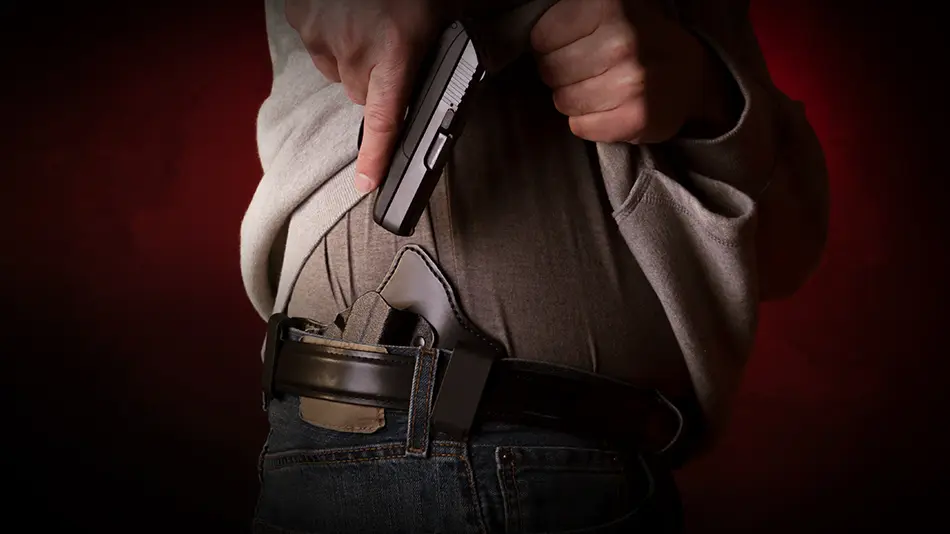I’m Gilbert Ambler, Independent Program Attorney for U.S. LawShield in Virginia. Today we’re going to discuss three non-lethal weapons that are legal options for self-defense in Virginia. While many of us train and practice using firearms for self-defense, it is important to consider carrying some non-lethal defense weapons.
Non-Lethal weapon #1: Pepper Spray
One option, recommended by many instructors, is to add some sort of pepper spray or OC spray to an everyday carry kit. In general, pepper spray and other similar products, when used reasonably, are not considered deadly force. This is an important consideration because there may be times when you begin to feel threatened, but deadly force is not justified under the circumstances.
Any analysis of self-defense in Virginia is going to focus on the word “reasonable.” Virginia allows you to use reasonable force to defend yourself against unlawful force.
Notice that here we are not talking about deadly force, but some lesser degree of unlawful force. For example, think of someone unprovoked, readying themselves to punch you. In this scenario, deadly force may not be reasonable depending on the facts, but using non-deadly force to repel the attack may be appropriate.
Law on Chemical Sprays and Weapons
Virginia Code 18.2-312 addresses the use of pepper spray. This statute makes it a crime to release mixtures of chemicals designed to and capable of producing vile, injurious, or nauseating odors or gases. However, the statute goes on to specifically note that it shall not prevent the use of tear gas or other gases in self-defense.
The lesson here is that you should be okay when using pepper spray in Virginia as long as you do so reasonably. A final note about pepper spray—be careful to check policies when carrying pepper spray. Many places that prohibit the carrying of a firearm will also prohibit the carrying of pepper spray.
Non-lethal weapon #2: Tasers or stun guns
Another great option for self-defense that generally amounts to less than deadly force is carrying a taser or stun gun. Tasers and stun guns work by producing a high voltage shock to temporarily incapacitate an attacker. They are generally legal to carry in Virginia, unless you are a felon who is carrying outside of your home.
Once again, the use of a taser or stun gun must be reasonable to repel the immediate unlawful application of force to you or a third person. We focus on the word reasonable again, because a taser may be a reasonable use of force to stop a fistfight. Conversely, someone patting you on the back, absent your consent, may still be unlawful force. Even if that were to be considered unlawful force, it would be difficult to convince a jury that tasing somebody was a reasonable response.
Non-lethal weapon #3: Batons
A final option for non-lethal self-defense that we hear questions about is a baton. A baton is somewhat of a hybrid category because depending on how it is used, it can easily be considered a deadly weapon. We are cautious about recommending the use of batons in Virginia.
Spring sticks, which expand by action of a spring when a button is pushed, are illegal to carry concealed in Virginia. Because the code governing spring sticks also covers weapons of like kind, we would advise against carrying a concealed baton absent a change in statute or clear case law indicating otherwise.
Creating Distance
All of these weapons give you space from an attacker. Generally, when you deploy something like pepper spray, you then run away to distance yourself from the attacker. Using these weapons may result in you fleeing from, what may potentially be a crime scene. It is for this reason that we encourage you as a LawShield member to promptly get in touch with your Independent Program Attorney if you are ever in a situation that necessitates using a weapon of these types of self-defense.
For any further questions regarding the use of non-lethal weapons in the state of Virginia, call U.S. LawShield and ask to speak to your Independent Program Attorney.





Can you carry the byrna non lethal handgun in the state of Virginia
This is a great question. If you’re a member, please call our non-emergency line to get an answer from an independent program attorney at 877-448-6839.
Why would if have to be concealed
Open carry state
Yes but it has to be concealed
This blog post provides a crucial perspective on the use of non-lethal options in self-defense situations. It’s enlightening to see how choosing non-lethal means can sometimes lead to better outcomes, both legally and ethically. I appreciate the breakdown of the laws surrounding these options in Virginia; it really clarifies what is permissible. Thank you for addressing such a vital topic!
This post really highlights the importance of understanding the difference between non-lethal options and actual combat situations. It’s a reminder that just because we have non-lethal tools at our disposal doesn’t mean we should approach conflicts with aggression. Education and responsible use are key!